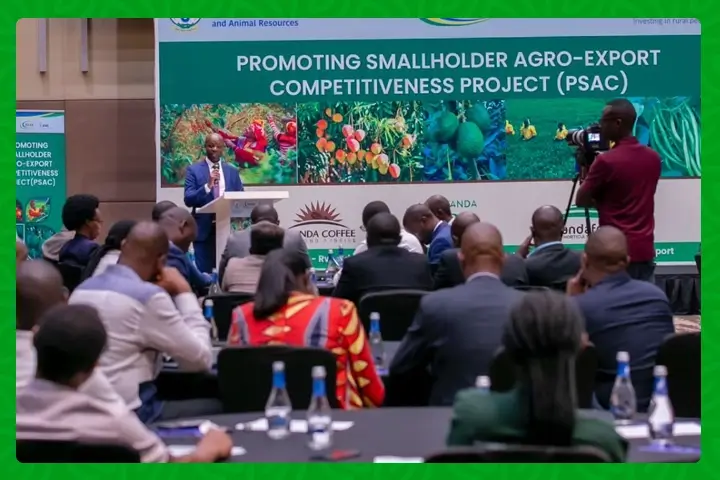
In a resounding commitment to uplift Rwanda’s agricultural landscape, the National Agricultural Export Development Board (NAEB) has embarked on a transformative journey. Partnering with esteemed collaborators, NAEB launched the Promoting Smallholder Agro-Export Competitiveness Project (PSAC) on March 1, a groundbreaking $62.89 million initiative poised to catalyze the export prowess of smallholder farmers across Rwanda. This article delves into the profound significance of PSAC, elucidating its multifaceted objectives and its potential to redefine the future of Rwandan agriculture.
Addressing Key Challenges:
PSAC stands as a beacon of hope for smallholder farmers grappling with myriad challenges in developing agricultural export value chains. With a strategic focus on coffee, tea, and horticulture, this ambitious project aims to bolster the competitiveness of Rwandan agricultural exports in target markets. By tackling barriers to market access and enhancing production capacities, PSAC endeavors to empower 56,695 households and approximately 255,128 household members, heralding a new era of inclusive growth and prosperity.
Strategic Financing and Partnerships:
Financed by the International Fund for Agricultural Development (IFAD) and esteemed partners such as Cordaid, the government of Spain, and Heifer International, among others, PSAC epitomizes the power of collaborative action in driving sustainable development. This formidable coalition of stakeholders underscores a shared commitment to fostering resilient and inclusive agricultural value chains, thereby amplifying the socio-economic impact of this transformative initiative.
Empowering Women and Youth:
PSAC is not merely a development project; it is a catalyst for gender-transformational change and youth empowerment. With a pledge to allocate at least 40% of project benefits to women and 20% to female-headed households, PSAC is poised to dismantle gender disparities and foster inclusive growth. Moreover, by targeting youth through wage employment opportunities and leadership development initiatives, PSAC seeks to nurture a generation of agripreneurs equipped to steer Rwanda towards a brighter future.
Strategic Implementation:
Spanning 14 districts across Rwanda’s provinces, PSAC adopts a strategic approach to project implementation, ensuring maximum impact and scalability. By enhancing climate-smart production practices and fostering market linkages, PSAC endeavors to bolster the resilience and competitiveness of Rwanda’s agricultural sector, thereby propelling rural communities towards sustainable prosperity.
Stimulating Economic Growth:
At its core, PSAC is a testament to Rwanda’s unwavering commitment to agricultural transformation and economic diversification. By harnessing the potential of export-driven value chains, PSAC aims to elevate the incomes of the rural poor and foster inclusive growth. Through targeted interventions in coffee, tea, and horticulture, PSAC seeks to unlock the latent potential of Rwanda’s agricultural sector, positioning it as a formidable player in the global market arena.
Harnessing Innovation for Resilience:
PSAC represents a paradigm shift in agricultural development, characterized by a relentless pursuit of innovation and resilience. From the adoption of climate-smart technologies to the rehabilitation of plantation areas, PSAC embodies a forward-thinking approach to agricultural development, one that is rooted in sustainability and adaptability.
Conclusion:
In conclusion, PSAC stands as a testament to Rwanda’s unwavering resolve to harness the transformative power of agriculture for sustainable development. As the nation sets its sights on ambitious export targets, PSAC emerges as a pivotal catalyst for realizing this vision, empowering smallholder farmers, fostering gender equality, and nurturing youth leadership. As Rwanda charts a course towards economic prosperity, PSAC stands poised to redefine the future of Rwandan agriculture, one smallholder at a time.
Original Article written by Michel Nkurunziza
Stay updated with the latest farming tips and agriculture industry news from Africa by subscribing to our newsletter. Don’t miss out on valuable insights and updates. Follow us on Twitter, LinkedIn, and Facebook to join our farming community and stay connected with us.



















